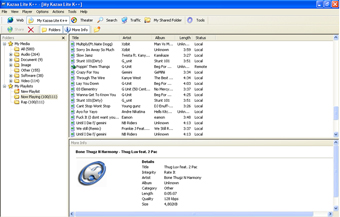Impacts
Legal Issues
It has been estimated that about 4 billion files are downloaded monthly at this point in time, about 50% of which is approximated to be the amount of music files being shared. In reaction to this evident and substantial loss of potential sales, the music industry has responded in its own way by moving in a direction that would embrace this music downloading revolution instead of straightforwardly condemning and discarding it. Companies have introduced internet-based music interfaces where users can go online and legally download music by paying fees. Rhapsody and Apple’s iTunes are examples of this online movement, making music more readily available to the consumer through means of the internet.
Recent lawsuits show the battle against illegal file sharing. Kazaa, a peer-to-peer file sharing network was recently fined over $115 million after losing a lawsuit to major music companies. While companies and programs like this one continue to run, the government has taken clear-cut action in its fight against music pirating. Nevertheless, with more legal alternatives like the internet-based music interfaces such as iTunes and Rhapsody, consumers will be given more access and to cheap and legal means of obtaining the music they want.

Screenshot of File Sharing Program, Kazaa
Ascent of the iPod and MP3 Players
With the wider usage of the MP3, the iPod and MP3 players like it were introduced to the market and quickly became popular ways for consumers to listen to music. Huge amounts of these devices have been produced and sold. Since 2002, over 67 million iPods have been sold, accounting for millions and millions of dollars in revenue for its manufacturer, Apple. Seeing how it is clear that MP3 players are increasingly popular, the market has adapted a little more to the consumer and the new arrival of the MP3, as the industry shifted from the CD to the more prevalent MP3.
The success and growth of these internet-based music interfaces are apparent. Rhapsody boasts a user base of more than 2.25 million subscribers. While companies like Rhapsody reach record highs and gain more users, the internet-based music interface is making headway in the music industry, involving millions of users to legally to participate in the music downloading revolution.

iPod, Apple's MP3 Player
Music Globalization
Through the internet, the world has become a smaller place. It has grown more highly networked and has helped make bigger strides toward globalization. With the expansion of music databases from which users can download online, globalization also occurs in the music world. As these internet-based music interfaces gain popularity, they expose users to a larger variety of artists. In this way, more of the lesser-known music can be accessed by users worldwide. Both consumer and artist benefit as the consumer enjoys a more eclectic variety of songs, the artist gains more exposure to a bigger online audience.
Competition
Now that we understand how internet-based music interfaces are gaining much popularity, it is reasonable to say that competition in this part of the music industry will grow. It is profitable market, clearly. Because of this competition among companies of different online music providers will increase, thus making more affordable and conveniently accessible music readily available for the average consumer. Already, iTunes charges only 99 cents to download songs, and many other companies often give out free downloads in attempts to get users hooked onto their own programs. The process of music affordability and accessibility becomes more apparent every day.